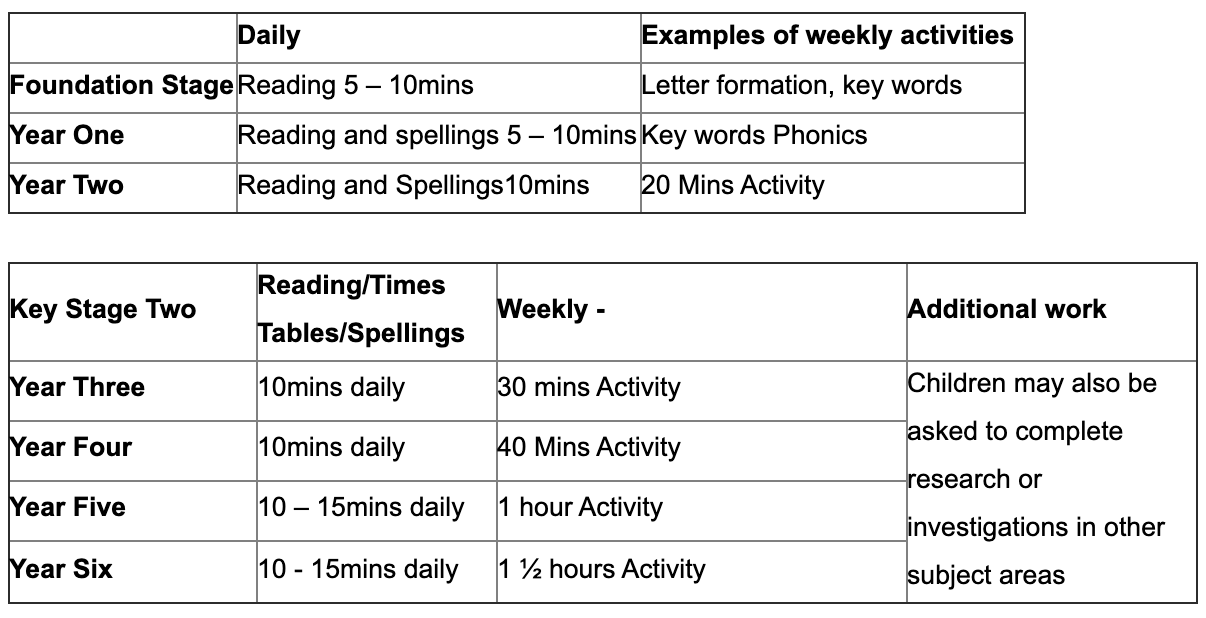Homework refers to any work or activity which pupils are asked to do outside lesson time, either on their own or with parents/carers. In order that pupils can attain the highest standards (spiritual, moral, social, cultural and academic) we recognise the crucial importance of an active educational partnership between home and school. Homework is one of the ways in which we seek to foster this partnership.
PURPOSES OF HOMEWORK
Children are given homework with the following aims in mind –
- To develop an effective partnership between the school and parents/carers in pursuing the aims of the school;
- To consolidate and reinforce skills and understanding, particularly in literacy and numeracy;
- To encourage use of home and community resources for learning (eg computers, internet, reference books, libraries, museums, swimming pools, train trips etc);
- To extend learning opportunities out of school
- To encourage pupils as they get older to develop the confidence and self-discipline needed to study on their own, thus preparing them for the requirements of secondary school.
- To provide opportunities for parents and pupils to work together to enjoy learning experiences.
AMOUNT OF HOMEWORK
The Government believes that a sensible programme of home activities at Key Stage One should take, on average, about 1 hour per week. Clearly, less should be expected of children in the Foundation Stage than those in Years 1 and 2. In Key Stage Two the demands should gradually increase so that by Years 5 and 6 children are spending about 30 minutes a day on homework. For all children these amounts of homework include time they spend reading or being read to by parents/carers.
PROCEDURES
Triscombe Class
Children will bring home a Reading Diary with their reading book and parents are asked to add comments that will help the teacher and the child. Miss Turner sets out her expectations each year as children work on the Early Reading and Number programmes.
Alfoxton and Beacon Classes
The expectations are:
- Reading and gaining a parental signature in their logs at least 3 times a week
- Learning tables on TT Rockstars
- Written homework is set once a week in Key Stage 2 by teachers. Please contact them about days it is set and expected to be handed in.
- Research to do with anything being learned in class
- Working on charitable deeds outside of school such as the Young Leaders Award for Year 5/6.
HOW TO COPE WITH HOMEWORK
The role of the parent is crucial to the success of homework. Families might usefully discuss the following issues:
- When is good time for homework to be attempted?
Straight after school? After TV? Early next morning
- Where is the best place for homework to be done?
In the bedroom? Somewhere close to a parent so that they can help?
- What aids concentration and stimulates hard work?
Silence? Background family chatter? Music?
It is vital that parents display a positive attitude to homework and value its importance, but at the same time recognise that it is the child’s responsibility to complete the work. The boundary between what many parents see as constructive help and what children view as interference is indistinct and frequently varies from day to day and between subjects. Listen hard to the children’s explanation of what they have to do and discuss whether your help is needed and what form this might take. Parents are asked to encourage their children to complete their homework and ensure that it is handed in on time, and to enquire if the work they are being set is not brought home on a regular basis.
